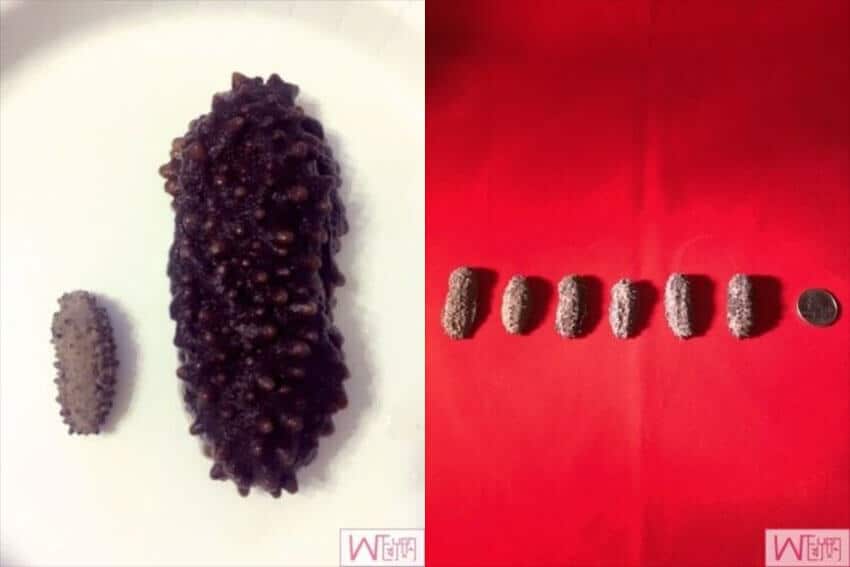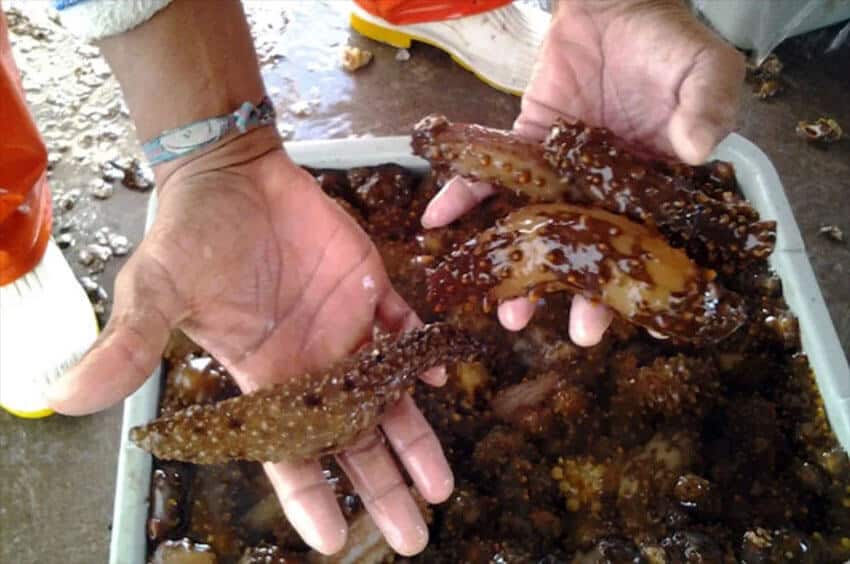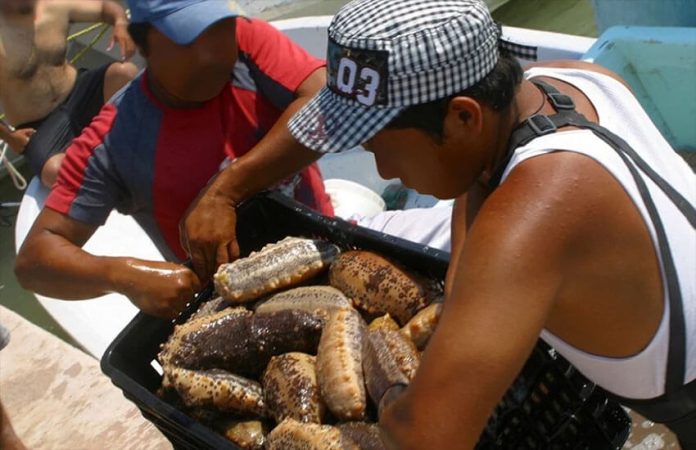Sea cucumber fishing was banned off the coast of the Yucatán Peninsula in early 2013, but almost 10 years later the marine animals are still being removed from the sea, leading to concerns that they could go extinct.
A Noticias Telemundo report examines the precarious situation faced by the sea cucumber, which is a sought-after commodity in Asia — especially China — and also exported to the United States.
“The sea cucumber was not something special, until the prices began to rise a lot,” Ricardo Domínguez Cano, a Yucatán-based fisherman and diver, told Noticias Telemundo.
“Many people then came from other states and settled in Yucatán for the cucumber. And they continued fishing, despite the ban,” he said. “The sea cucumber could be finished,” the third-generation fisherman added forlornly.
He’s far from the only person concerned about the future of the invertebrate animals, whose population off the Yucatán coast declined so much due to overfishing that the federal government enacted a ban on their removal from the sea in February 2013. Other fishermen, conservationists, scientists and scholars are also sounding the alarm, according to Cuauhtémoc Ruiz Pineda, a researcher at the National Institute of Fishing (Inapesca).
Although numbers remain low and the ban remains in place, sea cucumbers — known for “cleaning” the seabed by eating the organic detritus in the sand — are still being fished off the Gulf of Mexico coast of the Yucatán Peninsula. In 2020 alone, almost 1,600 tonnes of sea cucumber were fished in Mexico, according to the United Nations Food and Agriculture Organization. Mexican government data shows that 100% of sea cucumbers are exported, primarily to China, but the second largest export market is the United States.
In Hong Kong and other Chinese cities, a kilo of large, well-processed sea cucumbers can sell for over US $3,500, Noticias Telemundo said. The lucrativeness of the product — used in sauces, soups and traditional Chinese medicines — only encourages its illegal fishing.
Alicia Virginia Poot Salazar, a biologist and Inapesca representative in Yucatán, told Noticias Telemundo that sea cucumber fishing off the coast of the Yucatán Peninsula has been spurred by Chinese demand.

“Chinese businessmen came … [and] encouraged local fishermen to extract it when they saw the great value it has,” she said.
However, not all illegally extracted sea cucumbers are reaching their intended destination. A recent academic study found that Mexican and U.S. authorities seized over 100 tonnes of sea cucumber worth an estimated US $29.5 million between 2011 and 2021.
“The 97 incidents analyzed revealed 125 arrests, with an average of 1.29 arrests and 1037 kg of sea cucumbers seized per incident,” the paper said.
“… A qualitative review of these incidents reveals a number of key practices, including false identification, mislabelling, misreporting, stockpiling and invoice manipulation and fraud as means of laundering illicit catches. Also documented is corruption, the use of clandestine drying sites, and private vehicles for transportation. Media coverage of sea cucumber poaching and smuggling operations in Mexico frame the crime as being organized and conspicuous for its association with armed violence.”
Teale N. Phelps Bondaroff — the paper’s lead author, an illegal fishing expert and co-founder of the OceansAsia organization — said in a recent interview that “illegal fishing undermines conservation efforts, destroys wildlife populations and ecosystems, harms legal fishermen, steals dollars from governments, undermines good governance and social order, and fuels organized crime.”
Ruiz Pineda, the Inapesca researcher, said that without the sea cucumber, the ocean floor is changed as the animal’s cleaning of the seabed remineralizes and oxygenates it, which benefits other marine creatures.
The academic study found that Mexican authorities — despite the seizures and arrests — have been unable to stop the illegal fishing and trafficking of sea cucumbers.
Wherever the opportunity for fat profits exist in Mexico, the presence of organized crime groups can be expected, and illegal fishing — including that of sea cucumbers — is no exception. Cartels’ involvement in the lucrative totoaba trade — the fish’s swim bladder is considered a delicacy in China — has received significant attention, but there has been less focus on organized crime’s sea cucumber interests.

However, a Brookings Institution report released in March — “China-Linked Wildlife Poaching and Trafficking in Mexico“— noted that crime groups are also involved in the illicit trading of sea cucumbers in Yucatán.
“[The] direct connection between Chinese traders and Mexican fishers is now being altered by Mexican criminal groups. The Mexican criminal groups have pushed out Chinese traders from direct purchases from local fishermen in an effort to monopolize the illegal and legal fishing industries,” the think tank report said.
“The totoaba and abalone poachers are now compelled to sell to Mexican criminal groups who then sell to the Chinese brokers. This insertion of criminal groups into the seafood chains also developed in Yucatán sea cucumber harvesting. Although the sea cucumber has not recovered and ongoing poaching produces only a small harvest, Mexican organized crime groups in Yucatán now buy from local fishers and themselves sell to Chinese brokers, who are no longer allowed to buy directly from the fishers,” it said.
“… Mexican organized crime groups now operate from the get-go and deal with Chinese brokers to capitalize on new seafood commodities highly desired in Chinese markets.”
Among the crime groups that operate within Mexico’s illegal fishing industry are the Jalisco New Generation Cartel and the Sinaloa Cartel, the report said.
Written by security expert Vanda Felbab-Brown, the report also acknowledged the decimation of Yucatán sea cucumber stocks due to overfishing.
“Promoted by the Mexican government in the early 2000s, the commercial fishing of the several sea cucumber species took off in Yucatán and the offshore Campeche Bank about a decade ago when Chinese brokers started organizing the harvesting for Chinese markets, where sea cucumber is a pricey, sought-after delicacy, with putative traditional Chinese medicine qualities,” it said.
“But regulatory management and law enforcement measures could not keep pace and the harvesting turned into a gold-rush madness that ignored quotas and seasonal bans. … The harvesting also set off violent conflict among fishing communities, maritime banditry, and piracy as rival groups of fishermen sought to steal each other’s increasingly rare catch, and gave rise to village self-defense groups among the indigenous populations. The fishing led to the collapse of the ecologically vital species, which filters organic debris from oceans,” the report said.
“The sea cucumber population in the Campeche Bank went from 20,000 tonnes in 2009 to 1,900 tonnes in 2013, and fewer since. Bans imposed to allow the species to recover were ignored, with some 1,000 sea cucumber poachers operating in the Campeche Bank in 2018.”
The report said that legal and illegal fishing of several sea cucumber species for export to China also takes place along Mexico’s Pacific coast, where crime groups are also involved in the illicit seafood trade.
“In the Gulf of California, illegal sea cucumber harvesting has become rampant. Some of the species are gravely depleted, and in these highly protected species only very small quantities are permitted to be harvested. However, illegal harvesting over the quota and by unlicensed fishers continues to take place,” it said.
With reports from Noticias Telemundo and Reforma
